Sicily’s Mafia boss of bosses is dead.
The former capo of the Cosa Nostra, Salvatore 'Toto' Riina, one of the world’s most notorious criminals, died in prison in the northern Italian town of Parma at the age of 87 after a long fight with cancer and heart disease — a far cry from his heyday when he oversaw pubic bloodbaths, assassinations and waged brutal feuds with other Mafiosi trying to topple him.
He could be courteous before killing you.
One of his preferred methods of doing away with Mafia rivals, or lieutenants suspected of treachery, was to invite them over for dinner and after a convivial meal throttle them over a limoncello or grappa. He committed his first murder at the age of 18.
Nicknamed “The Beast,” he expanded Mafia killings, slaughtering women and children. He had a 13-year old boy strangled and dissolved in acid in a bid stop his father from divulging Mafia secrets and ordered the slaughter of eleven family members of another Mafia leader who became a state witness.
For some, Riina’s death Friday — he was serving 26 life sentences — marked the end of an era in Mafia history. In fact, it is more of a postscript.
The Cosa Nostra’s top leaders are all in jail, its infamous code of silence, Omertà, broke down long ago and its status and power has been eroded after years of internal feuds and determined anti-Mafia squads and brave judges — some of whom, like Giovanni Falcone, who became a national icon, and Paolo Borsellino, lost their lives in the effort.
It was Falcone’s 1992 murder that marked the start of the collapse of the old Mafia order — his death reverberated politically, forcing “Italy’s politicians to prove that they were not complicit in the murder,” according to author and Mafia historian John Dickie.
Of the five main mobs in Italy, the Calabria’s ‘Ndrangheta, Europe’s top cocaine trafficker, is now more deeply-rooted and powerful than Sicily’s Mafia, say Italian anti-Mafia officials — so too the Camorra of Naples, which traces its history back to the 14th century and focuses mainly on building frauds and securing public construction deals.
The Sacra Corona Unita in Italy’s southeast province of Puglia has also expanded. Originally preying on the local wine and olive oil businesses, it has moved into other lucrative areas, including drug trafficking, and has forged alliances with Albanian and Balkan crime syndicates.
Because of the Sicilian Mafia’s links to the United States, and due to movies like "The Godfather," the widespread public perception has been that the Cosa Nostra is very much a globalized crime brand. But Italian anti-Mafia officials say not to the same degree as the ‘Ndrangheta, which has put down deep roots in Latin America, partly thanks to mass Calabrian emigration, allowing Calabria’s mob to become the dominant supplier of cocaine to Europe, outstripping the Cosa Nostra.
The shifting fortunes of the Cosa Nostra can partly be blamed on Riina and his generation of Sicilian Mafia leaders. The times changed; they didn't. Their increasingly bloodthirsty violence and feuding came as Italy’s politics were changing and sowed the seeds of their downfall. Demands mounted for tough action against Mafia-linked politicians. Riina pushed back against the state, ordering a series of bombings across Italy in the 1980s and '90s that left 10 dead in explosions in Rome, Milan and Florence.
“By murdering Falcone and Borsellino, Shorty Riina and his entourage brought down the state’s retribution not just on themselves, but the whole Italian underworld,” argued Dickie.
Riina, who had been on the run since the 1970s but living in plain sight near his hometown of Corleone, a hardscrabble hilltop town near Palermo made famous by Francis Ford Coppola’s popular Godfather film trilogy, was captured in 1993, thanks to a tip-off from a former driver, six months after he had ordered a car-bomb death for Borsellino.
The son of a poor farmer, he was born on 16 November 1930. In 1943, his father and a brother were blown up trying to extract gunpowder from an unexploded American bomb. He rose up the ranks of the Mafia quickly, leaving a bloody trial as he did so.
“You’re not Toto Riina to me, you're just my father. And I wish you happy birthday, Dad, on this sad but important day. I love you,” one of his four sons, Salvo, wrote on his Facebook page Friday. Hundreds commented, passing on their condolences. But on other social media sites, including Twitter, hundreds of Italians registered their disgust, saying there should be no pity for Riina, just sympathy for his victims.
Italian newspaper La Stampa noted that the capo died unrepentant. “He was irreducible to the end, and only three years ago, talking to a co-detainee, boasted of Falcone's murder and continued to threaten the magistrates.”
In the last few weeks, Riina’s lawyers had been trying to get him released from jail so he could die a “dignified death” at home. But the applications were declined by officials with Maria Rosaria Bindi, chair of parliament’s anti-Mafia commission, arguing, “there is no right to death outside the cell.”
Giovanna Maggiani Chelli, president of the Association of Family members of the victims of a massacre ordered in Florence by Riina, commented: “God have mercy on him. We can’t forgive him.”




